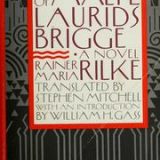The Notebooks of Malte Laurids Brigge – Rainer Maria Rilke – 1910
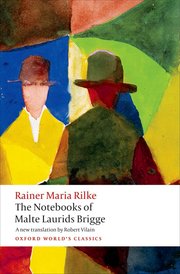
Posted by Steven on 5/7/2010, 22:26:10
I finished The Notebooks this evening. Don’t worry about spoilers–there is no plot to spoil.
I would describe the first two thirds of the book as “Proust meets Poe.” Malte is a young writer alone in Paris. He writes a few sketches about the people he meets, then plunges into an extensive reverie on his childhood as a mama’s boy among the rural gentry of Denmark. But there are no tasty madeleines. Instead, Malte’s Paris is peopled with the grotesque, the diseased, and the deformed. And the houses of his childhood are haunted with ghosts (both the visible and invisible kinds), enchanted pictures, and one genuinely scary disembodied hand. The adults worry about such things as being buried alive, and his parents give Malte a cheerful book about the gory deaths of deposed kings. (Some of which are recounted by Malte in brutal detail)
The last third of the book consists of passages that are loosely connected, if at all, just as though they were from the pages of a lonely and occasionally morbid young writer. The theme of death predominates, but there are also reflections on love and the arts–all with the same sombre tone, however.
I like much of this book, but by no means all of it. There are references to “he” and “her” that can only be deciphered with the help of footnotes. Many of the shorter passages are beautiful and striking prose poems. Some of the longer episodes, particularly those on historical themes, tend to labor towards a limited end.
In terms of content I described this book as Proust meets Poe, but in mood and theme it seems to lie more between Baudelaire and Celine.
~
Posted by guillermo maynez on 7/7/2010, 10:17:51, in reply to “Re: Rilke”
Steven’s review is excellent. My thoughts on the book are much the same, except I didn’t come up with the “Poe meets Proust” idea, which is to the point. I finished it last night. What I was planning to say was that, having read it right after “The Duino Elegies”, which I think are some of the best poems of all time, I think that Rilke tried to write a novel, but could only come up with a long prose poem. As expected from such an accomplished poet, many parts of it are beautiful and profound. Rilke is supposed to have been some kind of existentialist, of course not a la Sartre, but a la Kierkegaard (Malte is Danish, by the way), which shows in his obsession with loneliness, deformity, and death. And hopeless pasion. At first, when I still thought I was reading a novel, I became confused and re-read some parts to try to make sense of it. But pretty soon I said to myself: “You idiot, you are reading RILKE, not Dickens! Read it like a poem and you’ll enjoy it!” And so it happened.
~
Posted by Joffre on 7/7/2010, 22:58:50, in reply to “Re: Rilke”
I hope a couple of you are interested in talking about the elegies. I want to give it a try anyway. It seems to me that the more difficult works are, the more is to be gained from group reading and discussion, and I often find poetry difficult. I’ll just ask some questions I have about the first elegy.
What is he talking about when he says, “Is it any less difficult for lovers?” Is what any less difficult? And then, “But they keep on using each other to hide their own fate.” What is their fate? Is it that they too are essentially alone, each of them?
Who is he addressing in the next part? Himself? Youth? Those who died young? I suppose I think he is addressing himself, maybe his youth. How does the hero live on? How is his downfall merely a pretext for achieving his final birth? He lives on in a poem and his final birth was as the hero of the poem? What’s he saying with that about the arrow?
What does he mean about death being full of retrieval? The idea that death isn’t much different from life is terrible for me.
Oh, and I also like your review Steven.
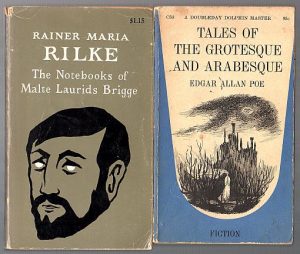
Posted by Steven on 10/7/2010, 10:42:19, in reply to “Die Erste Elegie”
: What is he talking about when he says, “Is it any
: less difficult for lovers?” Is what any less
: difficult?
The “it” is “the night” from several lines up. (This is clearer in German because the pronoun’s gender agrees with that of “night.”) Poulin translates this phrase “Is she easier on lovers?,” which has quite a different meaning.
: And then, “But they keep on using each
: other to hide their own fate.” What is their
: fate? Is it that they too are essentially alone, each
: of them?
I’m not sure if their fate–the night–is loneliness or death, but I lean toward the latter because he speaks of the night “waiting.
: Who is he addressing in the next part? Himself? Youth?
: Those who died young? I suppose I think he is
: addressing himself, maybe his youth.
I agree that it is most likely that he is addressing himself. It’s possible, I suppose, that he could be addressing a specific but unnamed person as he often does in his other works.
: How does the hero
: live on? How is his downfall merely a pretext for
: achieving his final birth? He lives on in a poem and
: his final birth was as the hero of the poem? What’s he
: saying with that about the arrow?
: What does he mean about death being full of retrieval?
: The idea that death isn’t much different from life is
: terrible for me.
Rilke’s references to angels and ghosts seems to reflect a belief in the spiritualism that was popular in his day (we’ve discussed here before how Thomas Mann and Arthur Conan Doyle were believers). But his notions are more sophisticated and cosmological. He appears to believe that we have a permanent existence that is independent of both space and time, but that we manifest temporarily as corporeal beings. Certain spirits (his angels) can, however, interact with the living in the form of inspiration. Art and music are a portal into the spirit world, and our notion of beauty is a manifestation of the eternal. (The phrases “haunting beauty” and “haunting melody” would have a literal meaning to Rilke.) But the spiritual existence is obviously not, for Rilke, a paradise. He invokes it with references to fear, darkness, void, and helplessness, making this a very cheerless and chilling, but beautiful, poem.
All of this could be just an elaborate metaphor for Rilke’s notions of Art, but some of the quotes from Rilke himself in the footnotes suggest otherwise. Of course like any tempestuous youth he probably changed his ideas frequently, so I wouldn’t be surprised if there are different notions of the supernatural in the later elegies.
~
Posted by Sterling on 10/7/2010, 13:56:05, in reply to “Re: Die Erste Elegie”
: What is he talking about when he says, “Is it any
: less difficult for lovers?” Is what any less
: difficult?
:
: The “it” is “the night” from
: several lines up. (This is clearer in German because
: the pronoun’s gender agrees with that of
: “night.”) Poulin translates this phrase
: “Is she easier on lovers?,” which has quite
: a different meaning.
William H. Gass has written an excellent work of criticism Reading Rilke: Reflections on the Problems of Translation that functions (as the title suggests) as both a critical discussion of Rilke’s work and an investigation of problems of translation in general. Gass offers his own translation of several poems, including the Duino Elegies. He translates the line as “Is she lighter for lovers?”
: And then, “But they keep on using each
: other to hide their own fate.” What is their
: fate? Is it that they too are essentially alone, each
: of them?
:
: I’m not sure if their fate–the night–is loneliness
: or death, but I lean toward the latter because he
: speaks of the night “waiting.”
:
Gass does not translate it as “fate” at all. His rendering of the line: “Ah, they only hide their loneliness in one another.” I can’t comment on Rilke’s intention since I read no German at all. The impatience in “Don’t you know yet?” suggests to me the essential aloneness that lovers fool themselves into thinking that they have overcome. For me, this makes more sense with the “Fling the emptiness,” the following phrase in both Mitchell and Gass
: How does the hero
: live on? How is his downfall merely a pretext for
: achieving his final birth? He lives on in a poem and
: his final birth was as the hero of the poem?
Steven, I again feel the need to defer to someone who can read German. Nevertheless, Gass eliminates the whole idea of dying and rebirth in the lines you are referring to, Joffre. His rendering: “Think: the hero endures, even his fading is a phase of renewal, he burns fresh each day.”
: What does he mean about death being full of retrieval?
: The idea that death isn’t much different from life is
: terrible for me.
“Retrieval” is Mitchell’s word. Gass translates the line to which you are referring as ” “And it’s difficult to be dead. There’s all that catching up to do before one feels just a little eternity.”
Mitchell is primarily a writer and translator of spiritual and religious works: the Tao Te Ching, the Bhagavad Gita, the Book of Job, the Book of Psalms, the “Gospel According to Jesus,” etc. It is natural that his own preoccupations would tend to push Rilke in an even more spiritual direction. I don’t necessarily feel that death is not much different than life in Rilke, but the Angels, who are beyond Death and Life, can not tell the difference. This is not, in my opinion, really a poem about what happens after death. It is a poem about the experience of living in a world of exquisitely intense and fine sensations, about the terror of beauty, and our fundamental isolation from one another.
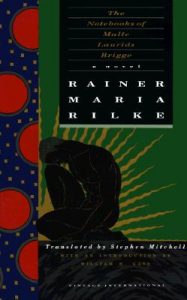
Posted by Steven on 10/7/2010, 16:39:33, in reply to “Re: Die Erste Elegie”
The first line in question reads in the original: “Ist sie den Liebenden leichter?” which literally translates “Is she [to] the Lovers lighter?” The subject is “she” simply because the word for “night” is feminine, so a more appropriate word in English would be “it.” However, if you say “Is it lighter…” in English, the “it” no longer appears to refer back to “Night,” (thus leading to the problem Joffre noted with Mitchell’s translation) so both Poulin and Gass retained the “she.” The word “leichter” in German translates equally as “lighter” or “easier,” so there’s no disputing either interpretation. I would lean towards translating it as “easier” because “lighter” in English can also mean “brighter,” (as in “Is the night brighter for lovers?”) while the German “leichter” carries no such meaning. Whew! So much work for a 5-word sentence!
In the other cases, the translations by Gass are considerably looser than Mitchell’s. I’m reading the Poulin translation, which is the most literal of the three, but similar in interpretation to Mitchell. The references to “fate” and “final birth” are exact translations of Rilke’s words “Los” and “letzte Geburt.”
Here is a quote from a letter Rilke wrote in 1925 concerning the Elegies. This if from a footnote in the Mitchell edition:
“Affirmation of life-AND-death turns out to be one in the Elegies… We of the here-and-now are not for a moment satisfied in this world of time, nor are we bound in it; we are continually overflowing toward those who preceded us, toward our origin, and toward those who seemingly come after us. In that vast ‘open’ world, all beings are–one cannot say ‘contemporaneous,’ for the very fact that time has ceased determines that they are.”
I’m not sure if this clarifies the point, but what we would call an “afterlife” would be, to Rilke, an existence in “non-time.” I’m not at all well-read in philosophy, but this view actually accords rather well with some of the interpretations of the physical world made by quantum physicists.
~
Posted by Joffre on 10/7/2010, 22:30:53, in reply to “Re: Die Erste Elegie”
At first I felt embarrassed about not realizing that it was night, but when I reread the poem, I still felt it was unclear. There is still something that prevents it from being clear. I am not disputing it though; I am sure you are right.
I lose the train of thought in this poem when he begins to talk about the hero. Maybe it’s actually because I don’t understand the line about the never attainable praising. The most ancient of sufferings is, I guess, loneliness, or since he mentions in the next line a beloved, unrequited love. Shouldn’t we free ourselves from that, so we can become more? Why is there no place we can remain?
What’s the message of those who died young? Live? Enjoy life? Then he begins to think about death it seems. I don’t think catching up clarifies retrieval for me.
He returns to those who were carried off early. Is that who he is elegizing?
I’m glad we could have some discussion of this. I appreciated all the answers and comments. I’ll try to post about the second elegy tomorrow (Sunday). Poems can be so difficult. Reading these, I wonder: how did we get from that to this, what is the connection? what’s he trying to say in these lines? I like the tone (if that’s the right word) of these poems though. As noticed, I have the Mitchell translation. Mine has no footnotes. I looked at another translation online to clarify something, but I didn’t like the other translation as well.
~
Posted by Joffre on 11/7/2010, 14:48:51, in reply to “Die Erste Elegie”
Who are you? That’s a rhetorical question to the angels, I guess. And this second stanza: he compares the angels to all this, I guess. I find the line about corridors, stairways, and thrones amusing, since thrones are an order of angels.
When moved by deep feeling we evaporate. Our ego, I guess. Then the emotion begins to fade and our ego returns? Someone can’t contain it, though he tries to evoke our feelings? Those who are beautiful are even less containable? Appearance rises and is gone. What? Then he imagines his appearance floating away. That is who we are? Who? People for whom emotion is fleeting?
How do we get to these lovers? What is it he asks them about us? Who is us? Solitary people? I’m afraid I just get more and more lost in this.
These kisses lead him to think of Greek tombstones? I like the bit about the sculptures knowing they can go this far and no farther in their caresses.
Like the statues, we want more than we’re capable of? Gazing at them soothes us?
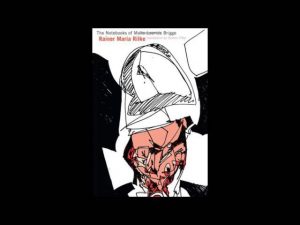
Posted by guillermo maynez on 12/7/2010, 11:35:46, in reply to “Die Zweite Elegie”
Joffre: your questions have elicited most interesting answers from Steven and Sterling. I will try to add something later. But my feeling is that you are reading poetry like you’re reading a novel or, even more, an essay. Poems are, by far, the means of expression where ambiguity has more room. In my opinion, there are no exact or precise ways of reading poems. Of course poems express ideas, but not in a rigorous, orderly fashion, as should be expected in an essay. Poems include more than meets the eye, and every person will tend to have different interpretations. Having said this, I think you can only gain from examining them so closely.
~
Posted by Joffre on 12/7/2010, 14:45:33, in reply to “Re: Die Zweite Elegie”
I accept that poems have more ambiguity than other forms of literature, but I take ambiguity as a choice between two or three options, not my total confusion. I also except that the actual words a poet uses might be the only concise way to express the idea he had in mind, but I think one should be able to theorize more clearly what he meant in several sentences. I also accept that a poem probably doesn’t have a sort of unified structure in which the end is latent in the beginning, but I think there is a general train of thought which one should be able to follow.
I think this might be an uncommon conception of poetry among the general public, but I cannot believe that the most astute readers get no more from poems than enjoyment of the tone or rhythm and a few particularly nice lines or ideas, and I get the feeling from some things I read in various biographies or general critical works that they are getting more.
I don’t know if anyone will want to scrutinize these poems as I do. It’s a lot of work. I’m reading these things at least eight or nine times. I certainly understand if people don’t think it’s worth that, or even feel that doing that somehow kills poetry. It’s quite possible, I’ll get tired of it myself. For now, I’m trying to make out the third elegy.
~
Posted by guillermo maynezEmail User on 12/7/2010, 16:24:33, in reply to “Re: Die Zweite Elegie”
Of course it is much worthwhile to scrutinize poetry in profound detail. For me, it has been fun and very interesting to read yours, Steven’s and Sterling’s comments. Especially when one approaches poetry as dense and as deep as Rilke’s Elegies. Let’s do it.
~
Posted by Sterling on 12/7/2010, 22:38:09, in reply to “Re: Die Zweite Elegie”
Great poetry demands close reading. Although there may be grace, music, and beautiful imagery apparent in a cursory reading, poetry generally requires the careful, painstaking study that you are suggesting, Joffre. Let’s go for it.
I can not possibly address all your questions concerning the Second Elegy, and it would be highly presumptuous for me to try. I will offer my interpretation of the poem.
I believe it concerns the nature of existence–the essence of existence. Angels are among the first embodiments of ultimate existence, and are therefore awesome and terrifying. We, on the other hand, are extremely evanescent — dew, steam, fading perfume. Rilke suggests that we believe that it is our emotions and our passions, especially sexual passion, that make us feel real, in the sense that the angels are real. But, he asks the lovers, “Where is your proof?” Just because our passion feels filled with the essence of the universe does not mean that it actually is filled with ultimate truth. Especially, it appears, because that trembling intensity of the first contact between lovers inevitably fades.
Rilke then connects the end to the beginning, by returning to ancient art. Raphael, the archangel in the Book of Tobit, can appear to Tobias as an unassuming young man. The figures in Attic grave reliefs touch each other with a gentleness and caution that is now lost to us. Perhaps the ancients (both Hebrew and Greek) had a closeness and understanding of the ineffable that is now lost.
Of course there is much more in this extraordinary poem, but I offer these observations as a starting point of discussion.
~
Posted by Joffre on 15/7/2010, 22:37:27, in reply to “Re: Die Zweite Elegie”
Hey Sterling,
I’m interested in that Gass book you mentioned. I take it you already had quite an interest in Rilke if you read that.
How’s your Kindle working, by the way? Still satisfied with it? I’m really thinking of getting one now that the price has come down so much.
~
Posted by Sterling on 16/7/2010, 23:21:50, in reply to “Re: Die Zweite Elegie”
William H. Gass’ Reading Rilke is in print and available at Amazon. Gass is an interesting writer. Only two novels, a handful of short stories, lots of essays. Sometimes classed with the postmodernists, but I think that he is fundamentally a modernist, with more in common with Faulkner than Pynchon. We might consider his novel Omensetter’s Luck for next year. I’m up for reading it again.
I have loved Rilke’s poetry for some time. Which is kind of odd, actually, because I’m generally not much of a poetry guy.
Yes, Joffre, I still like my Kindle very much. I particularly like the built-in dictionary, the fact that you can download tons of public domain works free, or nearly free, and the easy access to the Web, particularly Wikipedia. Often even new novels are cheaper for the Kindle, and it is fun checking out a book on Amazon, clicking on it, and having it within a minute or so in your hands. Pretty magical. Mind you, even if I could get absolutely everything I wanted to read on the Kindle, I still wouldn’t stop buying books. I love them too much as physical objects. But I still feel that I can recommend the Kindle.
~
Posted by Joffre on 13/7/2010, 16:18:46, in reply to “Die Erste Elegie”
Why does she know her lover from far away?
These ancient terrors, dark companions, are desires?
What does it mean for him to begin himself?
What is his fate that retreated behind the wardrobe? Just fear of the dark? His restless future is just his immediate future, the terrors of the night?
Why is the word was emphasised in that line? “there was no trace of caution in that sleeper;”
I get the feeling Rilke is writing about himself here. What do you all think?
Why is his heart light-green? Kind of makes me think of Spring, maybe because he is young. I don’t know. Green is, of course, evny, but it doesn’t seem like that here. Or is it the Spring of envy?
What’s this about us not accomplishing our love in a single year? There seems to be something in this poem about connecting us, or the subject to all history, all humanity. Maybe that’s kind of obvious.
Dead children reaching out to touch someone is a rather striking image.
What’s this ending about?
~
Posted by Steven on 14/7/2010, 19:11:38, in reply to “Re: Die Dritte Elegie”
To me this one seem the most direct and decipherable of the three so far. Definitely autobiographical. Rilke was a timid child, strongly attached to his mother, but later infatuated with his own artistic prowess and the frightening power it represents (at least to him).
He appears to be addressing the girl, his lover, as someone who can’t approach or understand his genius, but still serves both as an essential ingredient in his understanding of life, by replacing his mother as a source of love and comfort, by giving him inspiration, but also as someone to keep him grounded in reality.
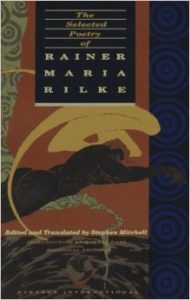
Posted by Joffre on 17/7/2010, 17:12:41, in reply to “Die Erste Elegie”
I don’t clearly see the contrast made by these lions. We’re not in harmony with nature. By the time we figure out where we need to go, we’re too old and just can’t hack it anymore. I guess it’s just that lions never know of such weakness, though it seems odd to think lions don’t sense the weakness in their bodies as they get older.
I don’t see the connection to the next stanza either. Unlike more natural creatures, we get distracted or pulled in different directions by life. Conflict is second nature to us, but not to animals in nature? Surely that’s a romantic view of animals.
Who’s this detested dancer?
What’s this next bit about? He’d prefer someone who was wholly something like a puppet to humans who are only half something?
What’s this puppet stage before which he must sit? Life?
What is it we separate by our very presence?
What is it that alone endures?
I’m getting tired of these.
~
Posted by Steven on 18/7/2010, 13:46:45, in reply to “Re: Die Vierte Elegie”
: Unlike more natural creatures, we get distracted or
: pulled in different directions by life. Conflict is
: second nature to us, but not to animals in nature?
: Surely that’s a romantic view of animals.
I think–or it would be better to say “guess”–his point is that “we” (all humans, or just those who share his sensibilities?) are prone to try to grasp all phases of our lives at any stage. We worry about old age when we are healthy (which lions never do). Even as children we start trying to understand death.
I laughed at his description of a suburbanite as someone who enters his house through the kitchen.
: I’m getting tired of these.
Me too. I read through the rest of the Elegies last night, but lacked the will to try to understand everything I read. Like Sterling, I’m not a “poetry guy,” though I do enjoy epics like the Iliad. Walt Whitman is fine too. Rilke and his ilk are best taken in small doses.
~
Posted by Joffre on 18/7/2010, 15:02:06, in reply to “Re: Die Vierte Elegie”
I’m no great lover of poetry either. There are, of course, some poems I like, and I also like book length poetry like the Odyssey (I’ve not yet read the Iliad.) or Eugine Onegin.
For some reason, I’ve always felt interested in Rilke’s Elegies, but I’ve never put this much effort into following them before. Right now, I feel a little annoyed. I know I’m no genius, but I think I’m reasonably intelligent. I feel like I ought to be able to follow the thoughts in these poems more or less clearly with this kind of effort. It makes me wonder if anybody really follows them. I guess I’m sure some do. Damned smart people.
~
Posted by Sterling on 18/7/2010, 20:07:04, in reply to “Re: Die Vierte Elegie”
I have enjoyed the book length poems, as well. The Iliad, the Odyssey, the Aeneid, Canterbury Tales, Paradise Lost…great and memorable stuff. I’ve never been able to get into The Faerie Queene, though. Have any of you read Browning’s The Ring and the Book? It’s supposed to be the finest novel in verse in English.
~
Posted by Joffre on 18/7/2010, 20:52:30, in reply to “Re: Die Vierte Elegie”
I read The Ring and the Book. It was about eight years ago. Can’t remember where I learned of it. I was intrigued by the story of its conception. I can’t say much about the book. I didn’t love it, but I didn’t dislike it either.
~
A website which is like a Rilke Museum: “I’m an enthusiastic reader of Rilke’s work.
This blog is an attempt to collect and share things related to Rilke, whether letters, portraits, poems or books.” http://duino-elegies.tumblr.com/page/23


